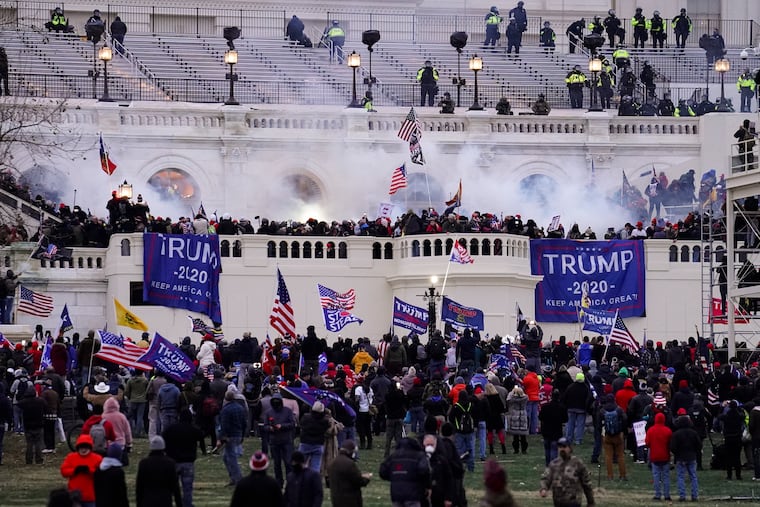It’s a ‘childish fantasy’ to ignore what happened Jan. 6, 2021
Too many of us see the U.S. as an idealized hero, like how children view their parents. It’s time for us to grow up.

On Jan. 6, 2021, President Donald Trump attempted to overthrow American democracy. With the second anniversary of his attempted coup approaching, the House of Representatives’ Jan. 6 committee has finally released its report, which details acts by Trump and also some Republican members of the House that I consider treasonous. Yet according to polls, many Americans don’t care. Reality doesn’t seem to matter to them. As far as they are concerned, no serious problems exist when it comes to the events of Jan. 6, and no actions need to be taken.
I believe that part of the explanation for this refusal to deal with reality is our insistence on idealizing our country.
» READ MORE: On 2nd anniversary of Jan. 6, Trump’s disciples succeed in shutting down the Capitol
Presidential candidates invariably claim that the United States is the greatest country ever. Not to do so would be political suicide. But to believe that our country is always the greatest, most flawless country ever is a lot like believing in Superman: an idealized, omnipotent hero.
As a psychoanalyst, I am aware that all children idealize their parents, who are big and tall and seem to have amazing powers, and that children admire heroes who seem to embody these same magical qualities. A major task of growing up, however, is to gradually recognize and accept the limitations of one’s parents.
Similarly, a good citizen has to recognize and accept the limitations of one’s country. Unfortunately, this has seldom been a part of American education.
“A good citizen has to recognize and accept the limitations of one’s country.”
When I attended elementary school in the 1960s, my education didn’t seem to suggest that we needed heroes — instead, the United States was The Hero. World War II seemed like ancient history, so my classmates and I were raised with the sense of American moral and military might as part of our country’s essence, rather than a relatively recent historical development. We hid under our desks in drills to protect ourselves from potential nuclear attacks by the evil Soviet Union, but we knew the United States was always good and right and strong. The great moral certainties of childhood — that the world is divided between good and evil, cops and robbers, democracy and tyranny — were never challenged by our curriculum.
We grew up with a sense of the United States as stable, permanent, and unchanging. There were no problems that needed to be addressed, nor any necessary improvements. No one taught me that the United States is only partially a democracy, that a citizen of Wyoming’s vote counted for nearly 35 times that of a citizen of my native New York, based on the latest census population data. As a result of this, rather than true democracy, we have leaders chosen by a vast overrepresentation of rural, white voters. We were taught that having stamped out the evil of slavery, American racism was now over, except in the South. The slaughter of Native Americans was barely a footnote to the glories of American expansionism.
Distinguishing our actual history from the mythology taught in our schools is a difficult challenge. We want to regard our country with the same awe and reverence that young children have for their parents. Maintaining such an idealized view, however, means departing from reality.
One of the things that many years of psychoanalytic practice have taught me is that if you want to succeed in the world, it helps to have a good relationship with reality. But a good relationship with reality, for either a person or a nation, requires the emotional ability to acknowledge problems, tolerate disappointments, recognize shortcomings, and atone for mistakes. None of these tasks is pleasant, but no useful responses to serious problems can be made without them. Whitewashing the past and spreading conspiracy theories in the present prevent reckoning with reality. In fact, this avoidance of reality becomes part of the American reality we need to examine.
When my son was 4, he wanted a reality check from me. “Is Superman real?” he asked. “Is Santa Claus real? Is Michael Jordan real?” While children enjoy believing in fantastical beings, they also work hard to try to distinguish fantasy from reality. So I answered him truthfully. I am pleased that now, as an adult, he appears to have a good sense of both my strengths and weaknesses; it helps him be his best independent self. I wish that, as Americans, we could also share a realistic understanding of our past and our present, our country’s strengths and weaknesses.
If we pretend our country is perfect, and that everything is fine, we indulge in a childish fantasy and ignore reality. If we can pay attention to the harsh realities the Jan. 6 committee report shows us, and act accordingly, we’ll have a better country.
Lawrence Blum is a psychiatrist and psychoanalyst. He teaches in the departments of anthropology and psychiatry at the University of Pennsylvania and at the Psychoanalytic Center of Philadelphia.